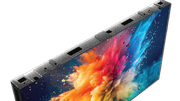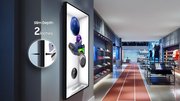Article
Who's afraid of digital signage?
Some viewers see a "Minority Report" future.

December 16, 2007
Digital signage professionals can't help but be excited when a large scale deployment goes off successfully or we see a new application gain popularity. The pros are excited, but what about everyone else? Are they scared of digital signage?
There has been an interesting conversation regarding digital signage going on in the blogosphere this past week. The string of responses succeeded a blog post on Web Outside entitled "What makes digital signage effective? Creepy?"
The author, Jayne Karolow of LocaModa Inc., quotes another blogger, Megan, saying, "[I]s it the future already? I didn't think so, but the electronic billboards on nearby streets seem to indicate otherwise. And that scares me. Because when ‘they' show ‘the future' in movies and such, it's never a happy place."
| ||||||||||||||||||||||
That's funny. I just saw that technology at this year's Digital Signage Expo, GlobalShop and Self Service Expos. In 2007. Not 2054. (See GestureTek's HoloPoint screen, which doesn't even require the user to wear gloves, as Tom Cruise had to in Minority Report.)
And with RFID technology rapidly advancing, digital signs can already recognize you based on a chip you may have with you. For example, the Hyatt Regency Chicago is considering adding RFID technology to its digital signage network so that conference attendees can view their personalized schedules when they approach a screen. The screen reads an RFID chip in their name badges. Customized greetings upon entry aren't seemingly far behind.
What's most interesting about the article is the difference in responses between members of the digital signage industry and people who only see digital billboards on the way to work. The industry professionals say that digital signage has immense potential and that we should all be excited about its growth.
On the other hand, from reading the posts of the non-industry professionals it seems there is a general concern as to how digital signage will be used in the future. Going back to Minority Report, poster Rob Everton writes: "When watching ‘Minority Report,' most people I know where horrified to imagine a world where every wall in a shopping mall assaults you with personalized video advertisements after scanning your retina upon entrance to the mall."
Again, check out Monster Media or Gesturetek's immersion-based advertising, where a camera mounted on a projector literally puts your face into an ad projected on the wall. We industry folk think this is cool, while others may be genuinely concerned about their privacy. Likewise, we see digital billboards as proliferation of the industry, while others seem to fear that the Empire State Building may one day turn into a "1000-foot-high blinking-dancing can of Coke."
Are digital signage professionals being narrow-minded by not to realizing how the public feels about these applications? I don't think so. I just think the ones who are creating the technology and the applications have a better idea of where digital signage is headed than anyone else.
Dave Weinfield, who says he is deeply entrenched in the world of digital signage, said, "I think we should all be excited about the growth of this industry rather than being fearful of how it can be misused."
Sounds familiar. Let's think back to the Internet in its early days. I'm sure there were plenty of speculations about how the Internet can be used for evil, but in today's world I believe that it has done more good than bad.
"Any new medium goes through the same growing pains," Karolow said.
 ChatGPT
ChatGPT Grok
Grok Perplexity
Perplexity Claude
Claude







